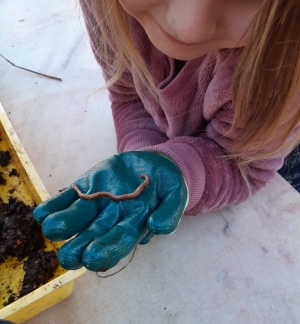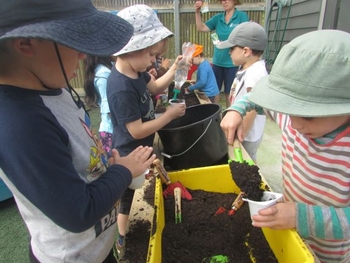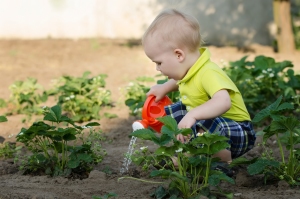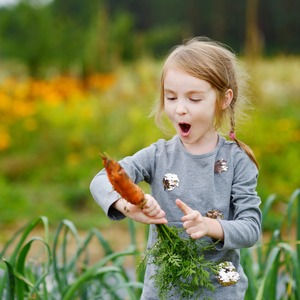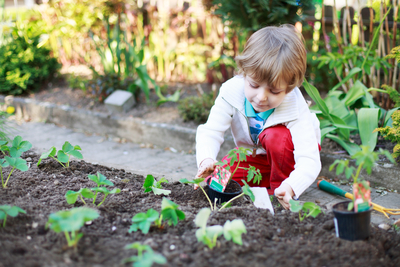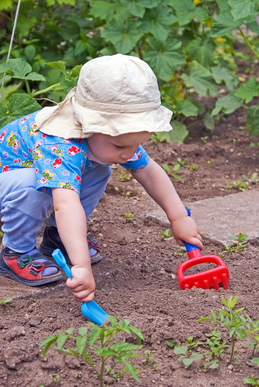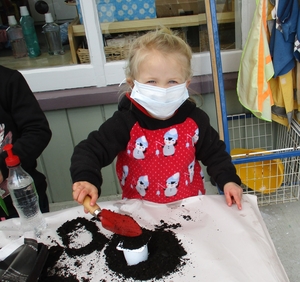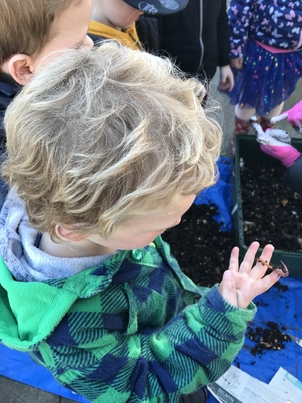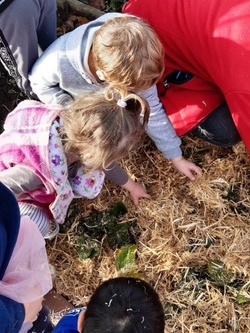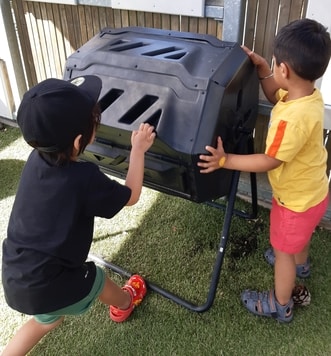I love worms. They are one of the most important creatures on the planet. I believe they’re right up there with bees for the importance of producing our food. Worms eat organic waste and turn it into nutrients that improve soil and provide fertiliser for plants. Earthworms tunnel through the soil, aerating it and making it easier for water to move through it to the roots of plants.
A worm farm is another example of how these little creatures help our soil. These worms, called Tiger Worms, are a different variety to the earthworm that lives in the garden. They eat their way through our food waste to produce fertiliser and compost that can be added to the garden soil to improve its quality.
Engaging children in regular and on-going gardening practices provides a range of benefits for their development. Not only does it give them hands-on access to the natural world and provides learning through all their senses – sight, smell, touch, taste and sound, but gardening also provides positive outcomes for health and well-being, and can support mental health.
I believe that those of us who work with young children have a responsibility to ensure they get the lots of opportunities to garden and grow food. The global pandemic and more extreme weather events have shown us more than ever that supply chains can easily become disrupted and access to readily available food can become difficult and expensive.
Knowing how to grow fruit and vegetables can be the key to ensuring there will always be food on the table.
I started vegetable gardening as a child, helping in my parent’s garden and later when I was at school, participating in a yearly gardening programme. The skills I learnt in childhood, while not used during my teenage and early adult years, were not forgotten. When I got my first home, one of the first things I did was start a vegetable garden and the skills and knowledge I had learnt as a child came back to me.
To develop the lifelong skill of gardening, young children need to be offered ongoing and sustained opportunities to garden. Embedding gardening in the curriculum so that it becomes part of every day life is one way to achieve this.
One of the things I am often asked by teachers is, “How do we stop tamariki from pulling out plants from the garden?”
This is something I have been thinking about, especially when I see some centre's with successful gardens and others not quite so much. We teach tamariki to respect each other, ie not to hit and to use their words, so how do we teach them to respect the garden?
Children love gardening, and learning about soil is a great way to get them involved.
Learning about soil involves digging and getting their hands dirty.
Working with soil helps connect children to Papatūānuku
As teachers we can support them in their interest if we know about soil too. We all know that plants need soil to grow, but is our soil healthy and will it support our plants to grow strong?
Soil is not just dirt; it is a lively ecosystem of micro-organisms that decompse organic material and turn it into humus-rich goodness that our plants need to grow healthy and strong.
Health and Safety, those three small words that can create such anxiety.
And when it comes to gardening with children in an early childhood setting, those three small words can be an even greater concern, but they don’t need to be. The health and safety issues are outweighed by the benefits children gain from gardening. However, they do need to be discussed and addressed.
Have you looked at the food waste that is left over on your kai table after each meal time and thought about where it goes?
According to 'Love Food, Hate Waste' we throw away 157,398 tonnes of food a year in New Zealand.
However, not all of that wasted food has to go to landfill. You can easily reduce or eliminate it by finding ways some way to compost it. That could be by putting it in local council greenwaste bins (if you are in an area that provides these), or even better set up a composing system with the tamariki in your centre.
There is more to gardening than planting a seed and taking care of it to maturity. It needs to be looked after and nurtured. And the more we involve children the more they learn this too. One of the gardening tasks they love to be involved in is mulching. It's fun and they get to make a mess - sometimes!
I’ve been talking about the benefits of mulch for quite some time now. In terms of being a gardener, I have been a late adopter, but after using it consistently for the last 5 years, I am a convert. Especially as the climate is changing, and our summers are getting hotter. This year in Christchurch we had 5 days in a row of mid 30 degree temperatures (not a common occurrence to have this many days in a row at those temperatures). When I pulled back the pea straw at the end of the day, if I could see that the soil was still damp below it, I knew I didn’t need to water. Over that time I only watered twice as the soil had retained the moisture due to the mulch.
I am a fan of early childhood centres making their own compost. What better way to cut down on your waste and carbon footprint, than composting your food and garden waste?
And even better, children learn the cycle of nutrients that comes from the decomposition of waste to release goodness back into the soil.
Every plant that grows in our garden sucks nutrients out of the soil. Overtime the soil becomes depleted of nutrients if we don’t feed it, and our plants won’t grow strong and healthy. Compost helps to replenish the nutrient levels in the soil.
Privacy Policy

